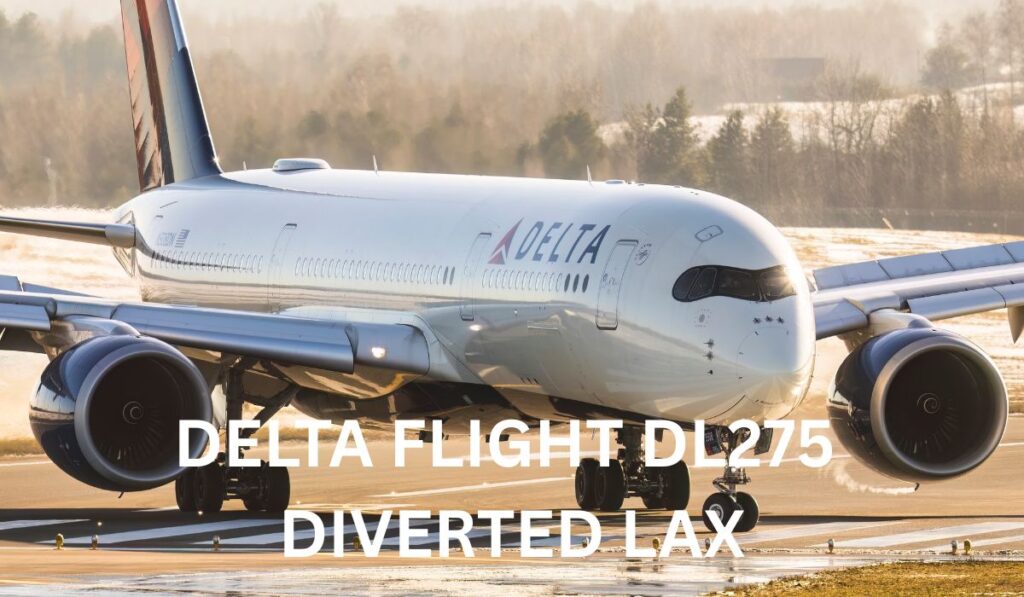Unexpected events are part of air travel, but they’re never routine for those involved. Recently, Delta Flight DL275 diverted LAX, drawing attention from both aviation enthusiasts and concerned travelers eager to understand what led to the sudden change of plans. This article takes a closer look at what happened aboard the flight, why diversions occur, how Delta handled the situation, and what passengers can expect when such events unfold.
A Routine Flight Becomes an Unexpected Journey
On what began as an ordinary transpacific journey, Delta Flight DL275, operating from Seoul Incheon International Airport (ICN) to Atlanta Hartsfield-Jackson International Airport (ATL), found itself unexpectedly rerouted to Los Angeles International Airport (LAX). While Delta has not disclosed every operational detail, initial reports indicate the diversion was triggered by a medical emergency onboard a scenario airlines are well-prepared to handle, but one that understandably raises concerns among passengers and the broader public.
Diversions like this one highlight how even well-planned operations can change rapidly in aviation. In the case of delta flight dl275 diverted lax, the crew had to weigh passenger health, logistical challenges, and safety considerations all in real-time and often under considerable pressure.
Why Do Flights Divert?
Flight diversions are not uncommon, though they remain unsettling for travelers. One of the most typical causes includes:
- Medical emergencies – Illnesses or injuries requiring immediate attention beyond what’s available in-flight.
- Technical issues – Mechanical concerns that, while perhaps not immediately dangerous, demand attention at the nearest suitable airport.
- Weather conditions – Severe turbulence, storms, or unexpected changes in visibility that make continuing unsafe.
- Security concerns – Incidents onboard that compromise passenger or crew safety.
For delta flight dl275 diverted lax, preliminary statements suggest a medical situation required swift intervention. Aviation protocols dictate that when a passenger’s life could be at risk, the crew must prioritize landing at the nearest airport capable of providing the necessary medical care.
Passenger Experience During an Emergency Diversion
While safety always comes first, diversions inevitably impact passengers. Those aboard delta flight dl275 diverted lax likely experienced:
- Announcements from the cockpit explaining the situation as transparently as possible.
- Coordination by cabin crew to ensure passengers remained calm and secure.
- Extended travel times as the aircraft lands, handles medical needs, and awaits clearance to resume its journey or for passengers to make alternative arrangements.
Passengers on such diverted flights often describe a mixture of relief that medical help is available and frustration over delayed travel plans. However, most understand the necessity, especially when someone’s health is on the line.
How Delta Airlines Handles Diversions
Large airlines, such as Delta, have established protocols for managing situations that arise during flight. When faced with a situation like delta flight dl275 diverted lax, Delta’s operational teams would immediately coordinate:
- Communication with air traffic control to secure a landing slot at the new airport.
- Preparation on the ground for medical responders or technical teams.
- Assistance for passengers with rebooking, accommodations, and updates.
One of Delta’s hallmarks is its emphasis on customer service. The airline typically issues public statements after significant diversions and works to minimize disruption for affected travelers.
Impact on Airline Operations
While passenger safety is paramount, diversions carry significant operational and financial implications for airlines. A single reroute can lead to:
- Crew timing issues – Federal regulations limit how long pilots and cabin crew can remain on duty.
- Aircraft repositioning costs – Once the immediate emergency is addressed, airlines must figure out how to get the aircraft and its passengers to the intended destination.
- Passenger compensation or rebooking expenses.
In the case of delta flight dl275 diverted lax, Delta will likely absorb costs related to the diversion, from fuel and ground services to customer care expenses.
Lessons for Passengers
While diversions are rare relative to the millions of successful flights each year, passengers can prepare by:
- Carrying essential medications in their carry-on luggage.
- Remaining calm and following crew instructions during unexpected changes.
- Allowing flexible travel time whenever possible to accommodate delays.
The incident with delta flight dl275 diverted lax serves as a reminder of the professionalism required of pilots, flight attendants, and ground teams who manage emergencies while keeping safety the highest priority.
A Reminder of Aviation’s Complex Reality
Modern air travel is incredibly safe, but as delta flight dl275 diverted lax shows, unexpected events can still arise. For travelers, the key takeaway is that diversions, while disruptive, are crucial decisions made in the interest of passenger well-being.
For more details on this incident and a thorough breakdown of what led to the diversion, visit delta flight dl275 diverted lax. This in-depth resource offers additional insights into how Delta handled the situation and what passengers should know if faced with a similar experience.
Final Thoughts
While no passenger wants to experience a diversion, airlines like Delta train rigorously to handle emergencies with precision and care. The incident involving delta flight dl275 diverted lax underscores how even in moments of crisis, aviation professionals work tirelessly to keep passengers safe and to get them back on their journeys as quickly as possible.




